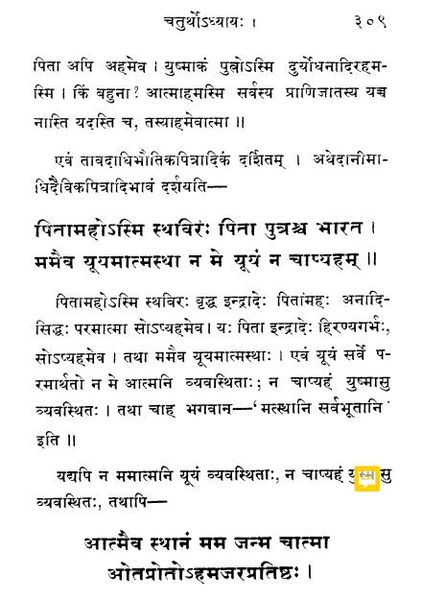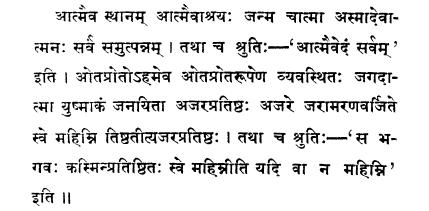Sarvatmabhava of the Aparoksha Jnani - Mahabharata
56 views
Skip to first unread message
V Subrahmanian
Sep 26, 2022, 7:31:33 AM9/26/22
to Advaitin
Sarvatmabhava of the Aparoksha Jnani - Mahabharata
Sanatsujata, who preached the esoteric knowledge to Dhritarashtra, concludes:
'I am the father, the mother, the son, I am the soul of the entire creation. Knowing Me, a wise man attains peace.'
एवं यः सर्वभूतेषु आत्मानमनुपश्यति।
अन्यत्रान्यत्र युक्तेषु किं स शोचेत्ततः परम् ।
यथोदपाने महति सर्वतः संप्लुतोदके।
एवं सर्वेषु वेदेषु आत्मानमनुजानतः ।।
(This verse is akin to the Bhagavad Gita verse: यावानर्थ उदपाने सर्वतःसम्प्लुतोदके । तावान् सर्वेषु वेदेषु ब्राह्मणस्य विजानतः ॥ ४६ ॥ 2.46:
(When a well or a pond is under one's possession - all one's water needs are fulfilled. Thus, if one has knowledge of Brahman, all worldly joys are inherent in it).
अङ्गुष्ठमात्रः पुरुषो महात्मा
न दृश्यतेऽसौ हृदि संनिविष्टः ।
अजश्चरो दिवारात्रमतन्द्रितश्च
स तं मत्वा कविरास्ते प्रसन्नः ।।
अहमेव स्मृतो माता पिता पुत्रोऽस्म्यहं पुनः।
आत्माहमपि सर्वस्य यच्च नास्ति यदस्ति च ।।
पितामहोऽस्मि स्थविरः पिता पुत्रश्च भारत।
ममैव यूयमात्मस्था न मे यूयं न वो ह्यहम् ।।
आत्मैव स्थानं मम जन्म चात्मा
ओतप्रोतोऽहमजरप्रतिष्ठः।
अजश्चरो दिवारात्रमतन्द्रितोऽहं
मां विज्ञाय कविरास्ते प्रसन्नः ।।
अणोरणीयान्सुमनाः सर्वभूतेषु जाग्रति।
पितरं सर्वभूतेषु पुष्करे निहितं विदुः ।।
।। इति श्रीमन्महाभारते उद्यगपर्वणि
सनत्सुदजातपर्वणि षट्चत्वारिंशोऽध्यायः ।।
This sarvatma bhava of Sanatsujata is completely in the order of the Upanishads.
ब्रह्म वा इदमग्र आसीत्तदात्मानमेवावेत् । अहं ब्रह्मास्मीति । तस्मात्तत्सर्वमभवत्तद्यो यो देवानां प्रत्यबुध्यत स एव तदभवत्तथर्षीणां तथा मनुष्याणां.. बृहदारण्यकोपनिषत् 1.4.10 Brihadaranyaka Upanishad:
Brahman knew itself as 'Aham Brahmasmi' and became the All. Thus the meaning of this mantra is that anyone who knows himself as 'Aham Brahmasmi' will also have the realization of his infinite nature.
In the Brihadaranyaka Upanishad, Vamadeva reveals his direct realization thus:
तद्धैतत्पश्यनृषिर्वामदेवः प्रतिपेदेऽहं मनुरभवं सूर्यश्चेति । 1.4.10
'I was Manu, I was Surya.'
The Taittiriya Upanishad states that an aparoksha jnani in his sarvatma bhava realizes 'I am the bhokta, bhogya and all' 2.10.6:
अहमन्नमहमन्नमहमन्नम् । अहमन्नादो३ऽहमन्नादो३ऽहमन्नादः । अहं श्लोककृदहं श्लोककृदहं श्लोककृत् । अहमस्मि प्रथमजा ऋता३स्य
In the Kaushitaki Upanishad, Indra is an Aparokshajnani. He preaches to one called Pratardana, who came to him for instruction, saying 'Know me alone':
‘मामेव विजानीहि’ (कौ. उ. ३ । १)
Here, in the Mahabharata, Sanatsujata saying मां विज्ञाय कविरास्ते पर्सन्नः (Knowing Me a wise man attains Peace) is based on the Upanishadic method.
If the above sentences refer to the Antaryami, and not the jnani, then the Antaryami Brahmana of the Brihadaranyaka Upanishad is contradicted:
एष त आत्मान्तर्याम्यमृतः ॥ ३ ॥ 3.7.3
'The Immortal antaryami, who is present in all, is your Atma.'
This Mahavakya informs us that the jiva is the innermost Pure consciousness that is Brahman.
If this is not accepted, I (I who am addressed as 'your Atma') will have to be anatma. Anatma is inert. I'm not inert.
Well, what all does this power regulate in our body? To this Dhruva replies:
योऽन्तः प्रविश्य मम वाचमिमां प्रसुप्तां
संजीवयत्यखिलशक्तिधरः स्वधाम्ना ।
अन्यांश्च हस्तचरणश्रवणत्वगादीन्
प्राणान्नमो भगवते पुरुषाय तुभ्यम् ॥ ६ ॥ Bhagavatam 4.9.6
Speech, Hand, Leg, Hearing, Touch, Pranas (can be senses) - all these are regulated by the Antaryami. It is the inert senses that need the Consciousness to enable them perform their functions . The Consciousness principle in me does not need the Antaryami to regulate it.
The 13th chapter of the Bhagavad Gita says that I am not this inanimate object, I am not anatma. In this stuti of Dhruva, the senses are all Kshetram, inert, and the spirit that which illuminates it, is the Kshetrajna.
So the Upanishad says that 'The Antaryami is your Self that rules over everything, enabling them to act in their domains'.
Not only this, the same Brihadaranyaka Upanishad says at the end of the same Antaryami Brahmana:
अदृष्टो द्रष्टाश्रुतः श्रोतामतो मन्ताविज्ञातो विज्ञाता नान्योऽतोऽस्ति द्रष्टा नान्योऽतोऽस्ति श्रोता नान्योऽतोऽस्ति मन्ता नान्योऽतोऽस्ति विज्ञातैष त आत्मान्तर्याम्यमृतोऽतोऽन्यदार्तं 3.7.23
No one can objectify his inner spirit because it is the self of all. I can know as a subject everything that is not me. All things known to me as object are inert. But I can never subject myself to myself.
This mantra tells us that there is none other than this Antaryami, who is the Knower, the Seer, the Hearer etc. in our body.
We all have the experience 'I am the knower, the seer, the listener, etc ', but we do not have the experience of 'someone else spoke, heard and saw'.
So it is decided that I am this internal spirit, the Antaryami, even by the yukti, reasoning, which is taught by this mantra above.
This is how we should understand the teachings of Sanatsujata.
Here below are some images of this Sanatsujatiya Shaankara Bhashya.
Om Tat Sat




Reply all
Reply to author
Forward
0 new messages
